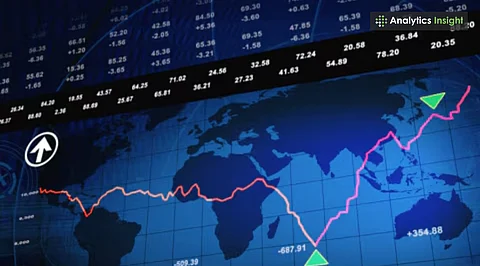

Largest Stock Exchange by Market Cap: The New York Stock Exchange leads the world in 2025 with a $31.7 trillion market cap.
Largest Stock Exchange by Region: US exchanges dominate, but Asia and Europe host several trillion-dollar players.
Basic Requirements for Being A Large Stock Exchange: A market cap of at least $3.8 trillion is required to enter the top 10 list.
The world stock market is controlled by a handful of enormous exchanges that together deal in trillions of dollars of listed securities. These exchanges are the main centers through which investors buy and sell shares, fueling both domestic and foreign economic activity. To be part of the worldwide top 10 in 2025, an exchange must have a minimum of $3.8 trillion in total listed market capitalization.
Stock exchanges define their size in two broad terms: number of listings (firms whose stocks are listed on the platform) and market capitalization (total value of all the listed shares). The largest exchanges are distributed between the United States, Europe, Asia, and India, each contributing to global capital flow.
Here are the largest stock exchanges in the world are:
Source: The data in the above table is taken from Yahoo Finance.
Let’s discuss the largest stock exchanges in depth.
The NYSE, which is owned by Intercontinental Exchange, is still the global leader with a market cap of $31.7 trillion. Situated at the center of Wall Street, it has 2,126 listed companies, including some blue-chip stalwarts. Its role in determining global markets has no peer.
With its high density of technology stocks, Nasdaq comes in second only to the NYSE with a market cap of $29.9 trillion. Host to Apple, Amazon, Microsoft, and Alphabet, the exchange has 3,285 listed issues, attracting investors focused on growth.
China's biggest exchange in Shanghai has a commanding $7.3 trillion market value with 2,284 listed firms. It serves as an essential conduit bringing Chinese companies to global investors with close controls from domestic regulators.
This group encompasses the Tokyo Stock Exchange, Osaka Securities Exchange, and Tokyo Commodity Exchange. With 3,958 listings and a $6.9 trillion market cap, it is a pillar of Asian capital markets.
Euronext is a pan-European exchange with listings in Paris, Amsterdam, Brussels, Dublin, Lisbon, Oslo, and Milan. With 1,808 listings and a $6 trillion market value, it is a focal point for European equity trading.
With 1,025 listed companies and a $5.9 trillion market value, the LSE remains an important gateway to global capital flows, both domestic and international listings.
The exchange of Hong Kong is a significant bridge between mainland China and foreign investors. With a market value of $5.2 trillion and 2,633 companies listed, it is an important player.
India's largest exchange, the NSE, rivals Hong Kong in market cap but beats it with 2,735 listed entities. It is a major player in South Asia's rapidly growing economy.
China's other giant, the Shenzhen Stock Exchange, boasts 2,872 listings and a market value of $4.6 trillion, with a reputation for having numerous innovative and high-growth firms.
Canadian-headquartered TMX Group runs the Toronto Stock Exchange and TSX Venture Exchange. With 3,581 listings and a market cap of $3.8 trillion, it completes the global top 10 list.
A bigger market cap generally translates into greater liquidity, which helps investors sell and purchase shares more easily without affecting prices significantly. Larger exchanges also find greater foreign listings, giving international investors wider choices.
For example, the NYSE and Nasdaq not only list local giants but also host American depositary receipts (ADRs) of international firms. This enables US investors to trade international stocks without accessing foreign exchanges. Likewise, Euronext and the London Stock Exchange enable cross-border investment within Europe.
The 10 largest stock exchanges in the world as of 2025 together oversee more than $106 trillion in market capitalization. Hence, highlight their pivotal position in the world of finance. Whether you are investing in tech-heavy Nasdaq, diversified NYSE, or developing markets through NSE, these exchanges continue to be the bloodstream of global trading.
The New York Stock Exchange remains the global leader with a $31.7 trillion market capitalization as of May 2025. It lists over 2,100 companies, including some of the world’s largest corporations in finance, healthcare, and consumer goods. Its long-standing reputation, deep liquidity, and investor trust make it a primary listing destination for major businesses worldwide.
Nasdaq stands out for its concentration of high-growth technology and innovation-focused companies. With a $29.9 trillion market cap, it hosts giants like Apple, Microsoft, Amazon, and Alphabet. Known for its electronic trading system, Nasdaq attracts companies that value speed, global reach, and access to tech-focused investors, making it a top choice for emerging growth stocks.
Market capitalization measures the total market value of all listed companies on an exchange. It reflects not just the number of companies listed but also their size and investor confidence. Higher market cap usually means greater liquidity, lower volatility for large trades, and stronger appeal for global investors. This metric is crucial in ranking the largest stock exchanges globally.
The National Stock Exchange (NSE) of India ranks among the top 10 with a $5.2 trillion market capitalization and over 2,700 listed companies. Its growth is fueled by India’s expanding economy, increasing foreign investment, and rising domestic participation in equity markets. The NSE also leads in technology adoption, offering advanced trading infrastructure and strong regulatory frameworks.
Stock exchanges act as critical platforms where companies raise capital and investors buy and sell securities. They ensure transparent price discovery, provide liquidity, and facilitate the flow of global capital. Beyond trading, exchanges also drive economic development, enable cross-border investment through secondary listings, and help integrate emerging markets into the global financial system.
